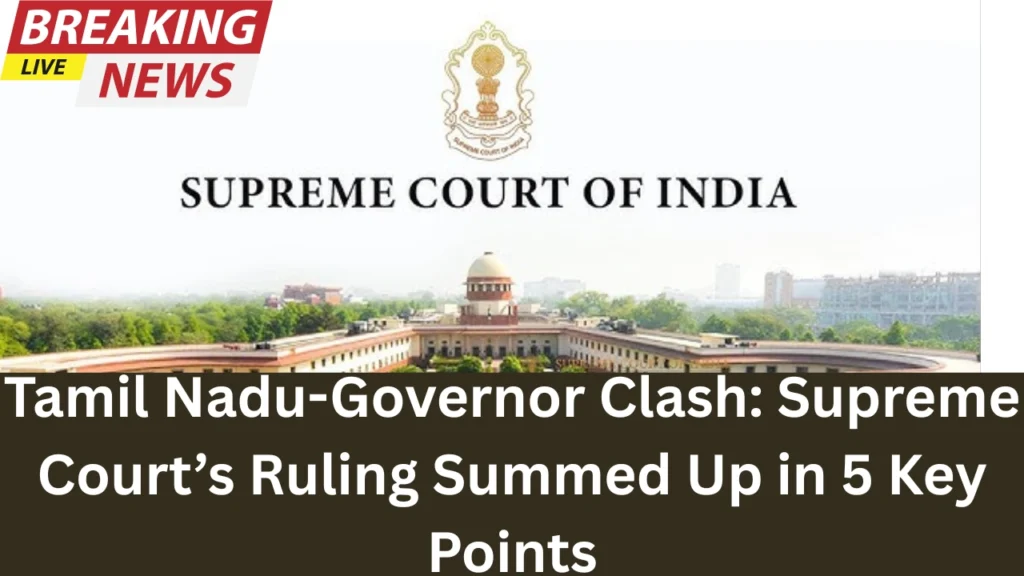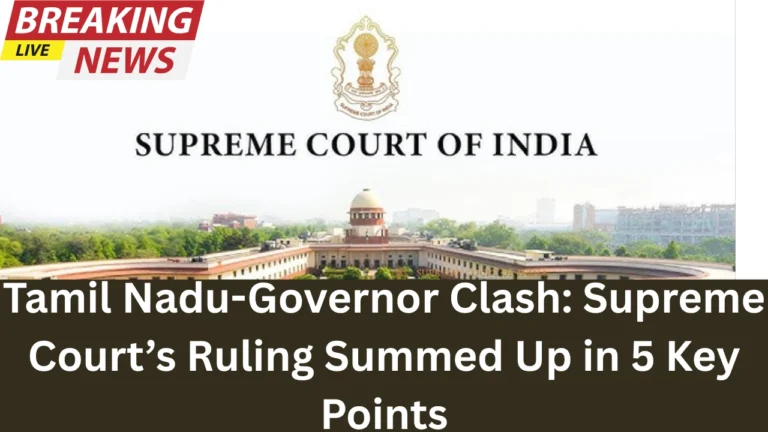In a landmark judgment delivered on Tuesday, the Supreme Court of India clarified the constitutional role of Governors in dealing with bills passed by state legislative assemblies. The ruling comes amid a long-standing dispute between the Tamil Nadu government and Governor R.N. Ravi, who had withheld or delayed assent to several bills, igniting a political and constitutional confrontation.

The verdict, penned by Justice J.B. Pardiwala, revolved around the interpretation of Article 200 of the Indian Constitution, which deals with the Governor’s powers regarding state legislation. In unequivocal terms, the Court rejected the notion of an “absolute veto” or “pocket veto” by the Governor, emphasizing that Governors must act in accordance with the Constitution and the advice of the elected government.
In a landmark win for Chief Minister MK Stalin–led Tamil Nadu government, the Supreme Court has, for the first time, set strict timelines for Governors to act on Bills passed by State Assemblies. The court ruled that Governor RN Ravi’s withholding of assent to 10 re-passed Bills… pic.twitter.com/FRXzHEqilg
— Everything Works (@HereWorks) April 8, 2025
This decision not only settles the Tamil Nadu case but sets a vital precedent for all Indian states, reaffirming the supremacy of democratically elected governments and clearly defining the constitutional limits of gubernatorial power.
What Led to the Legal Clash
The Tamil Nadu government, led by Chief Minister M.K. Stalin, had accused Governor R.N. Ravi of deliberately delaying assent to multiple bills passed by the state legislature. These included significant bills related to the functioning of state universities, appointment of Vice-Chancellors, and administrative reforms. In some cases, the Governor reserved the bills for the President’s consideration, without providing timely explanations or decisions.
Frustrated with the impasse, the Tamil Nadu government approached the Supreme Court, seeking clarity on the Governor’s role and responsibilities under Article 200.
Justice Jariwala’s Judgment: 5 Key Takeaways
1. Governors Must Act Within a Reasonable Timeframe
The Court made it clear that Governors cannot sit indefinitely on bills. While the Constitution does not specify a precise timeline for assent or return of bills, the principle of “reasonable time” was stressed.
“Governors must exercise their powers under Article 200 within a constitutionally reasonable time. Prolonged inaction defeats the purpose of a democratic process,” the Court stated.
This ruling directly addresses the practice of delaying decisions, which in effect functions as a pocket veto, despite such a concept not existing in the Constitution.
2. Governor Is Bound by the Advice of the Council of Ministers
The Supreme Court reaffirmed that Governors are not parallel centers of power. As per the Westminster model of parliamentary democracy, they must act based on the aid and advice of the council of ministers, who represent the will of the people.
“The Governor is a constitutional head, not an executive authority. Their function is ceremonial and must reflect the advice of the elected government,” Justice Pardiwala noted.
This point strengthens the hands of elected state governments and prevents gubernatorial overreach.
3. No Discretion to Reserve Bills After Re-Passage
In a critical clarification, the Court stated that once a bill is returned by the Governor and re-passed by the Assembly, the Governor must give assent unless the revised version differs materially from the original.
This directly responds to the Tamil Nadu Governor’s action of reserving 10 bills for the President after they were re-passed, which the Court deemed unconstitutional.
“There is no provision under Article 200 for the Governor to reserve a re-presented bill, unless the re-passed bill is substantially different from the earlier version,” the judgment emphasized.
4. Article 200 Must Be Interpreted to Uphold Democratic Mandate
The Court stressed that Article 200 cannot be interpreted in a way that allows the Governor to undermine the legislative will of the people.
“The Governor’s role is not to question legislative policy but to facilitate the democratic process,” said Justice Pardiwala.
This aligns with the constitutional spirit that the real executive power rests with the elected government, and not the Governor.
5. Tamil Nadu Governor’s Actions Were Unconstitutional
Perhaps the most direct part of the ruling was the condemnation of the Tamil Nadu Governor’s conduct. The reservation of 10 re-passed bills for the President’s assent was ruled inconsistent with Article 200.
“The Governor’s action in reserving bills after they were duly passed and re-passed by the Assembly amounts to a breach of constitutional duty,” the Court said.
This sets a legal precedent for similar cases in other states where Governors are accused of obstructing legislation through delays or overreach.
Impact of the Verdict: Reinforcing Federalism and Democratic Values
The Supreme Court’s decision is being hailed as a major boost to cooperative federalism in India. By reiterating that the Governor must respect the decisions of the elected government and act within a reasonable time, the Court has realigned the role of Governors within constitutional limits.
Legal experts and constitutional scholars have called the verdict:
- “A reaffirmation of democratic principles”
- “A check on unelected authority”
- “A vital safeguard for state autonomy”
It is also expected to deter Governors from delaying or blocking bills on political grounds, thereby reducing friction between state governments and the Raj Bhavan.
What Lies Ahead
Following this judgment, the Tamil Nadu government may push forward with reintroducing the affected bills, confident that the Governor cannot obstruct their implementation. The verdict also provides legal clarity to other Indian states facing similar disputes, including Kerala, Punjab, and West Bengal, where tensions between Governors and elected governments have been on the rise.
Moreover, the Centre may be prompted to issue clearer guidelines to Governors on how to handle state legislation, aligning with the Supreme Court’s interpretation of Article 200.
Conclusion
The Tamil Nadu-Governor conflict brought into sharp focus the delicate balance between ceremonial roles and real power in India’s federal structure. The Supreme Court’s ruling, with its 5-point clarity, is a definitive step towards protecting state autonomy, honoring the democratic mandate, and ensuring Governors act as facilitators, not gatekeepers.
As the dust settles, one thing is clear: Governors are not above the Constitution, and democracy cannot afford delays in its execution.

